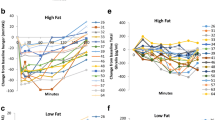Abstract
The present study investigated the effects of subjects' outcome expectancy on self-monitoring of a clinically relevant behavior, overeating. In conjunction with self-monitoring of eating habits, subjects received either a positive expectancy of behavior change or no expectancy regarding change. While both self-monitoring groups achieved significantly greater weight loss than controls, subjects in the expectancy group demonstrated significantly greater weight loss than no-expectancy subjects. Possible factors accounting for the disparity in findings between this and previous self-monitoring investigations are discussed.
Similar content being viewed by others
References
Borkovec, T. Effects of expectancy on the outcome of systematic desensitization and implosive treatments for analogue anxiety.Behavior Therapy 1972,3 29–40.
Ciminero, A., Nelson, R., and Lipinski, D. Self-monitoring procedures. In A. Ciminero, K. Calhoun, and H. Adams (Eds.),Handbook of Behavioral Assessment. New York: Wiley, 1977.
Hutzell, R. Expectancy effects upon self-recorded eye-blinking behavior.Behavior Therapy 1977,8 832–839.
Jeffrey, D. Behavioral management of obesity. In W. Craighead, A. Kazdin, and M. Mahoney (Eds.),Behavior Modification: Principles, Issues, and Applications. Boston: Houghton Mifflin, 1976.
Karoly, P., and Doyle, W. Effects of outcome expectancy and timing of self-monitoring on cigarette smoking.Journal of Clinical Psychology 1975,31 351–355.
Katz, R., Thomas, S., and Williamson, P. Effects of self-monitoring as a function of its expected benefits and incompatible response training.The Psychological Record 1976,26 533–540.
Kazdin, A. Reactive self-monitoring: The effects of response desirability, goal setting, and feedback.Journal of Consulting and Clinical Psychology 1974,42 704–716.
Nelson, R., Lipinski, D., and Black, J. The effects of expectancy on the reactivity of self-recording.Behavior Therapy 1975,6 337–349.
Oliveau, D., Agras, S., Leitenberg, H., Moore, R., and Wright, D. Systematic desensitization, therapeutically oriented instructions, and selective positive reinforcement.Behavior Research and Therapy 1969,7 27–33.
Sieck, W., and McFall, R. Some determinants of self-monitoring effects.Journal of Consulting and Clinical Psychology 1976,44 958–965.
Author information
Authors and Affiliations
Rights and permissions
About this article
Cite this article
Hobbs, S.A., Walle, D.L. & Hammersly, G.A. Effects of expectancy of outcome on the reactivity of self-monitoring. Journal of Behavioral Assessment 1, 281–288 (1979). https://doi.org/10.1007/BF01321370
Accepted:
Issue Date:
DOI: https://doi.org/10.1007/BF01321370




